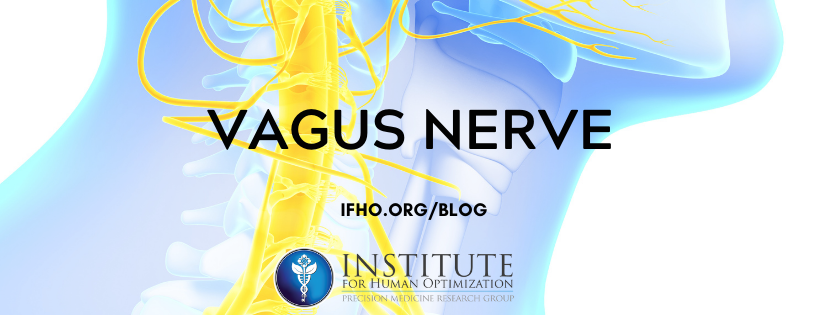VAGUS NERVE AND YOUR HEALTH
The vagus nerve, also known as the gut-brain axis, is the longest nerve in your body. This nerve starts in your brainstem and extends down to your abdomen. It plays a role in many of your body’s functions, including digestion, heart rate, and immune response. The vagus nerve is also involved in some mental health conditions, such as anxiety and depression. The vagus nerve is also a key player in your body’s nervous system, and it can be a major factor in your overall health. In this blog post, we’ll take a look at the vagus nerve and its role in your health.
WHAT IS THE VAGUS NERVE?
Vagus stands for wandering in Latin, and that’s an apt description for this nerve. The vagus nerve is a long, thin nerve that starts in your brainstem and extends down your neck and into your chest and abdomen. Nerves in the body are made up of bundles of nerve fibers, or axons, that transmit signals between the brain and the body. The vagus nerve is made up of both motor and sensory axons. Motor axons carry signals from the brain to the body, telling the muscles what to do. Sensory axons carry information from the body back to the brain. The vagus nerve is one of twelve cranial nerves, and it is the longest nerve in your body. This nerve plays a role in many different body functions, including digestion, heart rate, and immune response. The vagus nerve is also involved in some mental health conditions, such as anxiety and depression.
GUT-BRAIN AXIS
The vagus nerve is often called the gut-brain axis because it is involved in both gastrointestinal and mental health conditions. The gut-brain axis refers to the relationship between the brain and the gut, and it’s a key factor in your overall health. You can learn more about the gut-brain axis here: https://ifho.org/gut-brain-axis-the-ultimate-communication-channel/. The vagus nerve is responsible for sending signals between the brain and the gut, and these signals play a role in both digestion and mental health.
The gut-brain axis is a two-way street, and the gut can also send signals to the brain. The gut sends signals to the brain through the vagus nerve, and these signals can affect your mood and mental health. The gut also sends signals to the brain through the autonomic nervous system. The autonomic nervous system is the part of the nervous system that controls the body’s automatic functions, such as heart rate and digestion. The autonomic nervous system is divided into two parts: the sympathetic nervous system and the parasympathetic nervous system. The sympathetic nervous system is responsible for the “fight or flight” response, and it increases heart rate and blood pressure. The parasympathetic nervous system is responsible for the “rest and digest” response, and it decreases heart rate and blood pressure.
The vagus nerve is part of the parasympathetic nervous system, and it plays a role in the “rest and digest” response. When the vagus nerve is stimulated, it can decrease heart rate and blood pressure. The vagus nerve is also involved in the production of acetylcholine, a neurotransmitter that plays a role in memory and learning.
ACETYLCHOLINE
Acetylcholine is a neurotransmitter that plays a role in memory and learning. This neurotransmitter is produced by the vagus nerve, and it plays a role in both mental and physical health. Acetylcholine is involved in learning and memory, and it can also help to protect the brain from damage. This neurotransmitter is also involved in muscle contraction, and it can help to improve muscle function.
VAGAL TONE
Vagal tone is the term used to describe the activity of the vagus nerve. Vagal tone is measured by assessing the electrical activity of the vagus nerve. This measure can be used to assess the health of the vagus nerve and its impact on overall health. High vagal tone is associated with better health, and low vagal tone is associated with poorer health.
Vagal tone can be affected by many different factors, including stress, diet, and exercise. Stress can decrease vagal tone, while diet and exercise can increase vagal tone. Diet and exercise can also help to improve the overall health of the vagus nerve.
STIMULATING THE VAGUS NERVE
How can we take care of the vagus nerve?
There are a few things that can help to stimulate the vagus nerve:
- Diet: Eating a healthy diet is one of the best things you can do for your overall health, and it’s also good for the vagus nerve. Eating plenty of fruits, vegetables, and whole grains can help to improve vagal tone.
- Exercise: Exercise is another great way to improve your overall health and vagal tone. Getting regular exercise can help to increase blood flow to the vagus nerve and reduce stress levels.
- Massage: Massage can also help to stimulate the vagus nerve. Massaging the neck and head can help to increase blood flow to the vagus nerve.
- Cold therapy: Cold therapy, such as ice baths or cold showers, can also help to stimulate the vagus nerve. The cold temperature can help to increase blood flow and reduce inflammation.
- Stimulating activities: There are also some activities that can help to stimulate the vagus nerve. Activities such as singing, chanting, or even gargling can help to activate the nerve.
- Deep Breathing: Deep breathing helps to increase blood flow to the vagus nerve and reduce stress levels.
By following these tips, you can help to take care of your vagus nerve and improve your overall health.
WEARABLE DEVICES
Biometric devices, also known as wearable devices, refer to the measurement of biological features. This term is often used to describe the measurement of physical features, such as fingerprints or facial features. Biometrics can also be used to measure physiological features, such as heart rate or blood pressure. We see them commonly used in wearable smart watches, which track our fitness and sleep. Many wearables now track HRV (heart rate variability), which some experts believe is a good marker of vagal tone. HRV refers to the variation in the time between each heart beat. Low HRV is associated with high stress and poor health, while high HRV is associated with good health. You can learn more about HRV in our blog post here: https://ifho.org/blog-heart-rate-variability/.
While non-medical wearable devices should not be used to diagnose, track, or treat any health condition, they can be a helpful way to gain insight of your daily activities and key metrics that may influence your overall health.
Institute for Human Optimization
In conventional medicine, the vagus nerve is often overlooked. However, in functional medicine, the vagus nerve is considered to be an important part of overall health. The vagus nerve is involved in many different functions, and it can have a significant impact on overall health. Functional medicine practitioners believe that the vagus nerve can be a key player in many different health conditions. The vagus nerve is involved in the gut-brain connection, and it can impact gut health. The vagus nerve is also involved in the stress response, and it can impact the immune system.
At IfHO, we do that and more as partner with you to become your health intelligence partner with the goal of optimizing your health. We accomplish this with our signature precision medicine approach. We are a Maryland Functional Medicine but our providers use a combination of therapies that are tailored to your specific needs with a health optimization goal. We believe that our Medical Team should make use of the latest scientific research to offer our patients personalized medicine, based on real data. We call this precision health and it is the future of healthcare.
Our focus is not only looking at the root cause, but also to measure, quantify and optimize the patient’s personal health. We take a preventative approach, personalized, and precise approach in helping our patients control their risk factors early on in order to avoid chronic illness down the road. Our team of medical providers use a comprehensive approach with every patient that comes into our office, looking at all aspects of health including lifestyle, environment and genetics. There is no generic one size fit all protocols. No two patients receive the same treatment plan since we work with each individual to create a personalized plan. We empower our patients with the right tools and information, so they can take control of their own health. This is the future of longevity!





Leave a Reply
Want to join the discussion?Feel free to contribute!